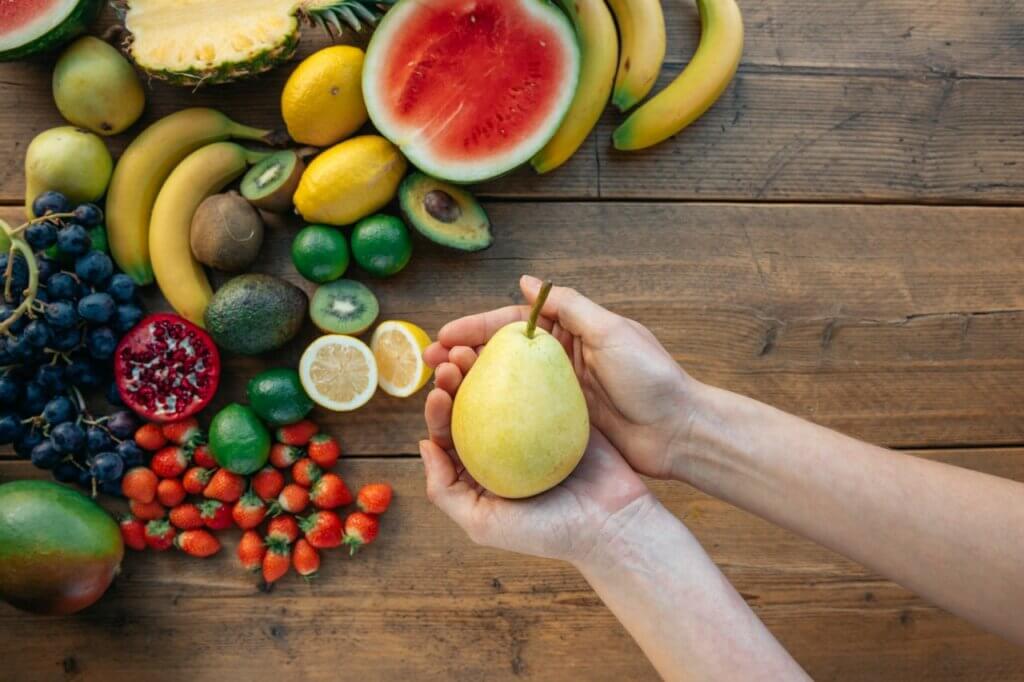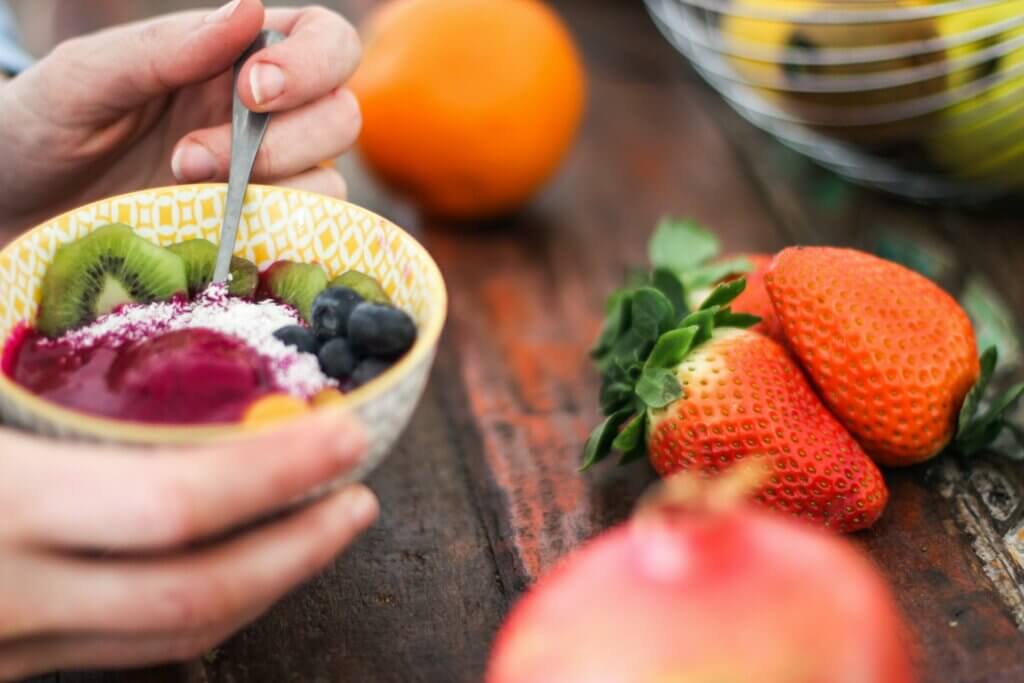The Best Fruits to Combat Constipation


Escrito y verificado por el nutricionista Saúl Sánchez
Constipation is a common condition in many people. It’s capable of bothering and even conditioning a person’s lifestyle. However, this problem can be reduced through diet. For this reason, today we want to tell you about the best fruits to combat constipation. By including them in your daily diet, you’ll achieve a more efficient intestinal transit.
First of all, it’s important to take into account that constipation can be caused by various causes. Some of them aren’t well identified and, therefore, no really effective treatment is known. However, there are always various guidelines that can help improve the problem.
The origin of constipation
This condition can be fundamentally caused by two factors: Inefficient intestinal motility or a problem in fluid reabsorption. Various factors, such as the composition of the intestinal microbiota, have been shown to directly influence the risk of developing constipation.
In this regard, probiotic supplementation can be an effective solution to this problem, especially in cases where it becomes chronic. This is evidenced by a study published in the European Journal of Pediatrics. Increasingly, the intake of bacteria is recommended to improve the management of intestinal diseases or to prevent their appearance.
The importance of fiber
One of the basic treatments for constipation consists of the systematic intake of fiber. This substance isn’t digestible by the body, only fermented. As a result, the size of the fecal bolus increases, which in turn stimulates the mechanical receptors of the intestinal wall more efficiently, generating a much more forceful peristaltic movement. Therefore, intestinal transit becomes more efficient and the fecal bolus descends through the tract with more dynamism.
According to research published in Alimentary Pharmacology & Therapeutics, fiber supplementation is capable of reducing the risk of developing constipation, as well as facilitating its management. However, not all fibers are the same. Soluble fiber is capable of fermenting, improving the composition of the microbiota, while insoluble fiber doesn’t retain liquid and simply thickens the size of the fecal bolus. The optimal thing is to ensure a combined contribution of both in order to attack all the possible causes of said condition.
Fruits to combat constipation
Below, we’ll present the best fruits to combat constipation and why.

Apples
Apples are known for containing a very efficient type of soluble fiber, known as pectin. This substance is capable of stimulating the growth of the strains of microorganisms that inhabit the intestine, improving its function. In addition, the fermentation of this kind of fiber produces a series of short-chain fatty acids with anti-inflammatory capacity, which is positive for the prevention of diseases that occur with inflammation and that can promote constipation.
It’s a good idea to include this fruit in the daily diet when there are frequent episodes of constipation. It’s also advisable to increase your water intake. One of the characteristics of soluble fiber is that it can bloat if combined with liquid, which causes intestinal distension and increased motility of the digestive tract.
Pears
For the same reason as apples, pears are fantastic foods for preventing or treating constipation. Both types of fruits can be combined to achieve an efficient intake of fiber. At the same time, it’s important to take into account that both contain a significant amount of water and antioxidants in their composition, which is also positive for the body.
Pineapple
Pineapple contains a series of proteolytic enzymes that help improve digestion. Making the nutrient metabolism process more efficient also improves the formation of the fecal bolus and its descent through the intestine, which reduces the risk of suffering from constipation or problems associated with said condition.
It’s best to eat pineapple after meals. If a meal is copious, this fruit will manage to help reduce the possible associated digestive discomfort.
Kiwi
Kiwi is another fruit that stands out for its fiber content and for the presence of proteolytic enzymes that help metabolize and digest nutrients, thus facilitating proper digestion.
It’s one of the foods most recommended by doctors to combat constipation episodes. In addition, it has a large amount of vitamin C, this being an essential nutrient in order to improve the functioning of the immune system and the synthesis of collagen.
The right time to consume the fruits

It’s possible to optimize the time of fruit intake so that, in addition to fighting constipation, you can benefit from its properties and reduce its possible contraindications. These foods generally have simple sugars in their composition. Specifically, they present fructose as the main dry constituent. This nutrient has been shown to be capable of negatively impacting liver health when consumed freely. However, whole fruit as such, due to its fiber content, reduces this effect.
However, it’s possible to further decrease the impact of fructose on blood glucose. For this, it’s best to consume the fruit after the midday meal, as a dessert. The fiber, fat, and protein in the food eaten will reduce the rate of gastric emptying and, with it, the peak of blood glucose. This way the pancreas will be less stressed and its function won’t be affected.
It should be noted that carbohydrates are metabolized more inefficiently at night and first thing in the morning. For this reason, it’s best not to eat fruit at night. This could be related to an increased risk of obesity due to the contribution of sugars. At breakfast, if fruit is included, it should be accompanied by foods with proteins and fats. In addition, you should avoid consuming this type of food between meals in isolation. Rather, it should be accompanied, for example, by nuts.
Fruit purees aren’t effective in preventing constipation
Just as fruits are effective for treating constipation, they lose their power when consumed in the form of purees or juices. This is because the fiber can be broken during crushing or directly wasted through squeezing. Discarding this component leads to a greater spike in blood glucose derived from the intake of fruits, as gastric emptying is much faster and the absorption of sugar is more efficient.
In fact, the regular consumption of fruit juices is associated with an increased risk of obesity and metabolic syndrome or diabetes. For this reason, this class of products shouldn’t be for regular consumption. The most advisable thing is to consume them in a very punctual way, so as not to generate constant pancreatic stress that puts its functioning at risk.
Other effective strategies to combat constipation
Fruit intake is not the only factor capable of reducing constipation or preventing its appearance. There are lifestyle habits, such as sports practice, which have also proven effective. In this way, the movement of the body generates an increase in the peristaltic reflex of the intestine, which translates into a more efficient intestinal transit.
In this regard, both strength and resistance sports can be useful in order to prevent the appearance of chronic constipation, or even improve its treatment.
In addition, it’s essential to guarantee an adequate and constant supply of water. Dehydration situations cause a higher rate of fluid reabsorption at the intestinal level, which generates a harder fecal bolus that has a harder time traveling through the digestive tract. It’s important to consume 2 liters of water a day. But in situations of chronic constipation, increasing that amount can be considered.
It’s also possible to find certain plants or herbs with laxative capacity, these being effective remedies for the treatment of constipation. In any case, they must always be used under the recommendation and supervision of a professional, so as not to exceed the dose. Otherwise, there could be problems with the absorption of certain nutrients, which generate deficiencies that are harmful to the body.

Fruits are effective in combating constipation
As we’ve stated, fruits are an effective way to combat constipation. However, not all have this ability. It’s advisable to opt for those with a higher fiber and water content. Those that present proteolytic enzymes in their composition have also shown to be useful in this regard.
In any case, reversing this situation involves more than just making adjustments to your diet. There are other measures that can be taken to improve intestinal transit and reduce associated discomfort, and regular physical exercise is one of them. This stimulates peristalsis and generates a much more efficient passage through the digestive tract.
Finally, the use of herbs or laxative plants and even probiotics shouldn’t be ignored either, although it’s always advisable to consider these alternatives under the supervision of a nutrition professional. Therefore, the diet can be adjusted accordingly and you can avoid nutrient deficiencies that affect your state of health. Keep in mind that the microbiota plays an essential role in the functioning of the digestive tract. For this reason, you should never neglect this organ, always ensuring its efficiency and its diversity in terms of microorganisms.
Constipation is a common condition in many people. It’s capable of bothering and even conditioning a person’s lifestyle. However, this problem can be reduced through diet. For this reason, today we want to tell you about the best fruits to combat constipation. By including them in your daily diet, you’ll achieve a more efficient intestinal transit.
First of all, it’s important to take into account that constipation can be caused by various causes. Some of them aren’t well identified and, therefore, no really effective treatment is known. However, there are always various guidelines that can help improve the problem.
The origin of constipation
This condition can be fundamentally caused by two factors: Inefficient intestinal motility or a problem in fluid reabsorption. Various factors, such as the composition of the intestinal microbiota, have been shown to directly influence the risk of developing constipation.
In this regard, probiotic supplementation can be an effective solution to this problem, especially in cases where it becomes chronic. This is evidenced by a study published in the European Journal of Pediatrics. Increasingly, the intake of bacteria is recommended to improve the management of intestinal diseases or to prevent their appearance.
The importance of fiber
One of the basic treatments for constipation consists of the systematic intake of fiber. This substance isn’t digestible by the body, only fermented. As a result, the size of the fecal bolus increases, which in turn stimulates the mechanical receptors of the intestinal wall more efficiently, generating a much more forceful peristaltic movement. Therefore, intestinal transit becomes more efficient and the fecal bolus descends through the tract with more dynamism.
According to research published in Alimentary Pharmacology & Therapeutics, fiber supplementation is capable of reducing the risk of developing constipation, as well as facilitating its management. However, not all fibers are the same. Soluble fiber is capable of fermenting, improving the composition of the microbiota, while insoluble fiber doesn’t retain liquid and simply thickens the size of the fecal bolus. The optimal thing is to ensure a combined contribution of both in order to attack all the possible causes of said condition.
Fruits to combat constipation
Below, we’ll present the best fruits to combat constipation and why.

Apples
Apples are known for containing a very efficient type of soluble fiber, known as pectin. This substance is capable of stimulating the growth of the strains of microorganisms that inhabit the intestine, improving its function. In addition, the fermentation of this kind of fiber produces a series of short-chain fatty acids with anti-inflammatory capacity, which is positive for the prevention of diseases that occur with inflammation and that can promote constipation.
It’s a good idea to include this fruit in the daily diet when there are frequent episodes of constipation. It’s also advisable to increase your water intake. One of the characteristics of soluble fiber is that it can bloat if combined with liquid, which causes intestinal distension and increased motility of the digestive tract.
Pears
For the same reason as apples, pears are fantastic foods for preventing or treating constipation. Both types of fruits can be combined to achieve an efficient intake of fiber. At the same time, it’s important to take into account that both contain a significant amount of water and antioxidants in their composition, which is also positive for the body.
Pineapple
Pineapple contains a series of proteolytic enzymes that help improve digestion. Making the nutrient metabolism process more efficient also improves the formation of the fecal bolus and its descent through the intestine, which reduces the risk of suffering from constipation or problems associated with said condition.
It’s best to eat pineapple after meals. If a meal is copious, this fruit will manage to help reduce the possible associated digestive discomfort.
Kiwi
Kiwi is another fruit that stands out for its fiber content and for the presence of proteolytic enzymes that help metabolize and digest nutrients, thus facilitating proper digestion.
It’s one of the foods most recommended by doctors to combat constipation episodes. In addition, it has a large amount of vitamin C, this being an essential nutrient in order to improve the functioning of the immune system and the synthesis of collagen.
The right time to consume the fruits

It’s possible to optimize the time of fruit intake so that, in addition to fighting constipation, you can benefit from its properties and reduce its possible contraindications. These foods generally have simple sugars in their composition. Specifically, they present fructose as the main dry constituent. This nutrient has been shown to be capable of negatively impacting liver health when consumed freely. However, whole fruit as such, due to its fiber content, reduces this effect.
However, it’s possible to further decrease the impact of fructose on blood glucose. For this, it’s best to consume the fruit after the midday meal, as a dessert. The fiber, fat, and protein in the food eaten will reduce the rate of gastric emptying and, with it, the peak of blood glucose. This way the pancreas will be less stressed and its function won’t be affected.
It should be noted that carbohydrates are metabolized more inefficiently at night and first thing in the morning. For this reason, it’s best not to eat fruit at night. This could be related to an increased risk of obesity due to the contribution of sugars. At breakfast, if fruit is included, it should be accompanied by foods with proteins and fats. In addition, you should avoid consuming this type of food between meals in isolation. Rather, it should be accompanied, for example, by nuts.
Fruit purees aren’t effective in preventing constipation
Just as fruits are effective for treating constipation, they lose their power when consumed in the form of purees or juices. This is because the fiber can be broken during crushing or directly wasted through squeezing. Discarding this component leads to a greater spike in blood glucose derived from the intake of fruits, as gastric emptying is much faster and the absorption of sugar is more efficient.
In fact, the regular consumption of fruit juices is associated with an increased risk of obesity and metabolic syndrome or diabetes. For this reason, this class of products shouldn’t be for regular consumption. The most advisable thing is to consume them in a very punctual way, so as not to generate constant pancreatic stress that puts its functioning at risk.
Other effective strategies to combat constipation
Fruit intake is not the only factor capable of reducing constipation or preventing its appearance. There are lifestyle habits, such as sports practice, which have also proven effective. In this way, the movement of the body generates an increase in the peristaltic reflex of the intestine, which translates into a more efficient intestinal transit.
In this regard, both strength and resistance sports can be useful in order to prevent the appearance of chronic constipation, or even improve its treatment.
In addition, it’s essential to guarantee an adequate and constant supply of water. Dehydration situations cause a higher rate of fluid reabsorption at the intestinal level, which generates a harder fecal bolus that has a harder time traveling through the digestive tract. It’s important to consume 2 liters of water a day. But in situations of chronic constipation, increasing that amount can be considered.
It’s also possible to find certain plants or herbs with laxative capacity, these being effective remedies for the treatment of constipation. In any case, they must always be used under the recommendation and supervision of a professional, so as not to exceed the dose. Otherwise, there could be problems with the absorption of certain nutrients, which generate deficiencies that are harmful to the body.

Fruits are effective in combating constipation
As we’ve stated, fruits are an effective way to combat constipation. However, not all have this ability. It’s advisable to opt for those with a higher fiber and water content. Those that present proteolytic enzymes in their composition have also shown to be useful in this regard.
In any case, reversing this situation involves more than just making adjustments to your diet. There are other measures that can be taken to improve intestinal transit and reduce associated discomfort, and regular physical exercise is one of them. This stimulates peristalsis and generates a much more efficient passage through the digestive tract.
Finally, the use of herbs or laxative plants and even probiotics shouldn’t be ignored either, although it’s always advisable to consider these alternatives under the supervision of a nutrition professional. Therefore, the diet can be adjusted accordingly and you can avoid nutrient deficiencies that affect your state of health. Keep in mind that the microbiota plays an essential role in the functioning of the digestive tract. For this reason, you should never neglect this organ, always ensuring its efficiency and its diversity in terms of microorganisms.
- Ohkusa T., Koido S., Nishikawa Y., Sato N., Gut microbiota and chronic constipation: a review and update. Front Med, 2019.
- Wojtyniak K., Szajewska H., Systematic review: probiotics for functional conspation in children. Eur J Pediatr, 2017. 176 (9): 1155-1162.
- Christodoulides S., Dimidi E., Fragkos KC., Farmer AD., et al., Systematic review with meta analysis: effect of fibre supplementation on chronic idiopathic constipation in adults. Aliment Pharmacol Ther, 2016. 44 (2): 103-16.
- Lustig RH., Fructose and nonalcoholic fatty liver disease. J Calif Dent Assoc, 2016. 44 (10): 613-17.
Este texto se ofrece únicamente con propósitos informativos y no reemplaza la consulta con un profesional. Ante dudas, consulta a tu especialista.







